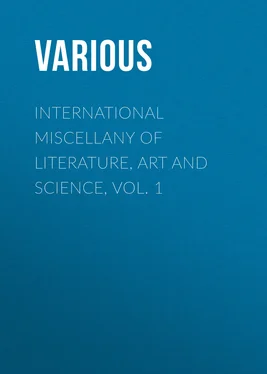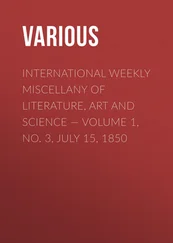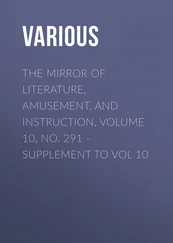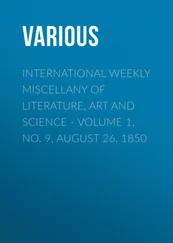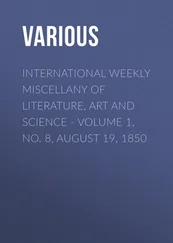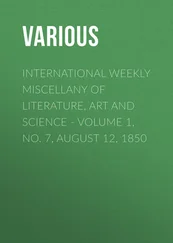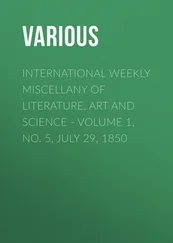Various - International Miscellany of Literature, Art and Science, Vol. 1
Здесь есть возможность читать онлайн «Various - International Miscellany of Literature, Art and Science, Vol. 1» — ознакомительный отрывок электронной книги совершенно бесплатно, а после прочтения отрывка купить полную версию. В некоторых случаях можно слушать аудио, скачать через торрент в формате fb2 и присутствует краткое содержание. Жанр: foreign_antique, periodic, foreign_edu, на английском языке. Описание произведения, (предисловие) а так же отзывы посетителей доступны на портале библиотеки ЛибКат.
- Название:International Miscellany of Literature, Art and Science, Vol. 1
- Автор:
- Жанр:
- Год:неизвестен
- ISBN:нет данных
- Рейтинг книги:3 / 5. Голосов: 1
-
Избранное:Добавить в избранное
- Отзывы:
-
Ваша оценка:
- 60
- 1
- 2
- 3
- 4
- 5
International Miscellany of Literature, Art and Science, Vol. 1: краткое содержание, описание и аннотация
Предлагаем к чтению аннотацию, описание, краткое содержание или предисловие (зависит от того, что написал сам автор книги «International Miscellany of Literature, Art and Science, Vol. 1»). Если вы не нашли необходимую информацию о книге — напишите в комментариях, мы постараемся отыскать её.
International Miscellany of Literature, Art and Science, Vol. 1 — читать онлайн ознакомительный отрывок
Ниже представлен текст книги, разбитый по страницам. Система сохранения места последней прочитанной страницы, позволяет с удобством читать онлайн бесплатно книгу «International Miscellany of Literature, Art and Science, Vol. 1», без необходимости каждый раз заново искать на чём Вы остановились. Поставьте закладку, и сможете в любой момент перейти на страницу, на которой закончили чтение.
Интервал:
Закладка:
In 1832 she came with her father to the United States, where she played with unprecedented success in the principal cities, confirming the reputation she had acquired, of being the greatest British actress of the age. While here she published her dramas, "The Star of Seville" and "Francis the First," and at this period she was a frequent contributor to the literary journals,—many of her best fugitive poems having appeared in the old "New York Mirror."
In 1834 she retired from the stage, and was married to Mr. Pierce Butler of Philadelphia, a gentleman of fortune, accomplishments, and an honorable character. The history of this union is sufficiently notorious. On both sides there was ambition: it was a distinction to be accepted by a woman of so much genius; it was a great happiness to change the dominion of a spendthrift and sometimes tyrannical father for that of a rich and indulgent husband. But a woman accustomed to the applause of the theater never yet was content with the repose of domestic life, and she was of all her sex the most ill-fitted by nature for such an existence. Her second resort to the stage in 1847, her fortunes at Manchester and in London, her return to America, her public readings of Shakspeare here, her divorce, and the very curious and unexplained circumstance of her translation of a profligate French play, and disposal of it as a piece of her own original composition, are all matters of too late occurrence to need recapitulation.
She is a woman of masculine abilities, tastes, and energies; fitted better for the camp than for the drawing-room, and often evincing a degree of discontent that she is not a man. She always acts , and has seldom, except when on the stage, the tact or ability even to seem natural. Her equestrian exhibitions in Boston and New York, during her more recent visits, illustrated the quality of her aspirations. Every day, at a particular hour, so that a crowd might assemble to look upon the performance, her horse was brought to the front of her hotel, and when mounted, with affected difficulty, made to rear and pitch as if he never before had felt the saddle or bit, and then to dash off as if upon a race-course or to escape an avalanche. The letters to her husband, with much tact but without any necessity displayed to the public, in her answer to his process for divorce, were admirable as compositions, and seemed to have been written in the very phrensy of passion; but their effect upon the reader was changed somewhat when he reflected that she had been sufficiently self-possessed meanwhile to make careful copies before sending them, to be exhibited, as specimens of her genius, to a mob of the pit, which never fails to recognize a point . Indeed, in petticoats or in pantaloons, making a show of her "heart" in the publication of these letters to a gentleman whom she had treated with every species of contempt, obloquy, and insult, until she had made his home insupportable, or courting the wondering admiration of country bumpkins by unsexing herself for feats of horsemanship, or for other athletic diversions, she is always anxious to produce a sensation, anxious to stir up the gentle public to a roar.
Still, with all her infirmities of taste and temper, Mrs. Kemble is a woman of unquestionable and very decided genius; a genius frequently displayed in literature, where its growth may be traced, in prose, from her foolish "Journal in America" to her more artistic "Year of Consolation;" and in poetry, where its development is seen from its budding in "Frances the First" to its most perfect blossoming in the recent collection of her "Poems." As an actress, her powers and qualifications are probably greater than those of any other tragedienne now on the English stage; and her characteristics and supremacy are likely to be far more profitably as well as distinctly evinced in her "Shakspeare Readings" than in any appearance before the footlights.
LITERATURE IN AFRICA
The Bible has been translated into the principal language of eastern Africa, and the American Bible Society has lately received a copy of "EVANGELIO za avioondika LUCAS. The Gospel according to St. Luke, translated into Kinika, by the Rev. JOHN LEWIS KRAPF, Phil. Dr.; Bombay American Mission Press: T. Graham, printer; 1848." The Kinika language is spoken by the tribes living south of Abyssinia, toward Zanzibar. Dr. Krapf is a German missionary, in the service of the Church Missionary Society. He is now in Germany for the recovery of his health. The language resembles in some particulars the dialects used in Western Africa. The Independent copies, as a philological curiosity, the Lord's Prayer in Kinika:
"Babawehu urie mbinguni, Rizuke zinaro. Uzumbeo uze. Malondogo gabondeke hahikahi ya zi, za gafiohendeka mbinguni. Mukahewehu utosao, hu-ve suisui ziku kua ziku. Hu-ussire suisui maigehu; hakika suisui kahiri huna-mu-ussira kulla mutu akos saye zuluyehu. Si-hu-bumire suisui magesoni, ela hu-lafie suisui wiini."
The British Association for the Advancement of Science assembled this year at Edinburgh, and its first general meeting was held on Wednesday, the 31st of July, when Sir DAVID BREWSTER, upon taking the chair, delivered a very interesting address upon the history of the Association, and the progress of the Sciences. On Thursday, business began in all the sections, and in the evening Prof. Bennett delivered a lecture on the passage of the blood through the minute vesicles of animals, in connection with nutrition. On Friday, a party of about seventy started under the direction of Mr. R. Chambers, to examine into the groovings on the western face of Corstophine Hill, and the striæ on the sandstone near Ravelstone. They afterward visited Arthur's Seat and St. Margaret's, where they examined the striated rocks and stones. In the evening there was a conversazione and promenade. Saturday was devoted to excursions. On Monday afternoon upward of two hundred members dined together, Sir David Brewster presiding. In the evening, Dr. Mantell delivered a lecture on the extinct birds of New Zealand. On Tuesday evening there was a full-dress promenade and soirée . On Wednesday, the general committee assembled to sanction the grants that had passed the Committee of Recommendations: and in the afternoon of the same day the concluding general meeting of the Association, for the accustomed ceremonial proceedings, was held. The next annual meeting is to take place at Ipswich, and Mr. Airy, the Astronomer Royal, will preside. The meeting, altogether, was one of unusual interest; among the persons present were the chief lights of science, in the empire and from the continent, and our own country was represented by Prof. Hitchcock and several other scholars. The papers read in the various sections were numerous, and some of them are described as of very remarkable freshness and value. They will soon be accessible in the published Transactions, which will this year be more voluminous than ever.
The retiring President, Dr. Robinson, at the opening meeting, congratulated himself on being able to surrender his dominion to his successor in a more prosperous condition than he had received it, and spoke in glowing terms of the character and scientific achievements of that successor, of whose labors he gave a brief but glowing history. Sir David Brewster, who was one of the founders of the Association, is a native of Jedburgh, in Roxburgshire; where he was born December 11, 1781. He was educated for the Church of Scotland, of which he became a licentiate; and in 1800 he received the honorary degree of M. A. from the University of Edinburgh. While studying here he enjoyed the friendship of Robison, who then filled the Chair of Natural Philosophy; Playfair, of Mathematics; and Dugald Stewart that of Moral Philosophy. In 1808, he undertook the editorship of the "Edinburgh Encyclopaedia," which was only finished in 1830. In 1807 he received the honorary degree of LL. D. from the University of Aberdeen; and in 1808 was elected a Fellow of the Royal Society of Edinburgh. Between 1801 and 1812 he devoted his attention greatly to the study of Optics; and the results were published in a "Treatise on New Philosophical Instruments," in 1813. In 1815 he received the Copley Medal of the Royal Society for one of his discoveries in optical science; and soon after was admitted a Fellow of that body. In 1816, the Institute of France adjudged to him half of the physical prize of 3000 francs, awarded for two of the most important discoveries made in Europe, in any branch of science, during the two preceding years; and in 1819, Dr. Brewster received from the Royal Society the Rumford gold and silver medals, for his discoveries on the Polarization of Light. In 1816 he invented the Kaleidoscope, the patent-right of which was evaded, so that the inventor gained little beyond fame, though the large sale of the instrument must have produced considerable profit. In 1819, in conjunction with Dr. Jameson, he established the " Edinburgh Philosophical Journal "; and subsequently he commenced the " Edinburgh Journal of Science ," of which sixteen volumes appeared. In 1825, the Institute of France elected him a Corresponding Member; and he has received the same honor from the Royal Academies of Russia, Prussia, Sweden, and Denmark. In 1831, he received the Decoration of the Hanoverian Guelphic Order; and in the following year, the honor of Knighthood from William the Fourth.
Читать дальшеИнтервал:
Закладка:
Похожие книги на «International Miscellany of Literature, Art and Science, Vol. 1»
Представляем Вашему вниманию похожие книги на «International Miscellany of Literature, Art and Science, Vol. 1» списком для выбора. Мы отобрали схожую по названию и смыслу литературу в надежде предоставить читателям больше вариантов отыскать новые, интересные, ещё непрочитанные произведения.
Обсуждение, отзывы о книге «International Miscellany of Literature, Art and Science, Vol. 1» и просто собственные мнения читателей. Оставьте ваши комментарии, напишите, что Вы думаете о произведении, его смысле или главных героях. Укажите что конкретно понравилось, а что нет, и почему Вы так считаете.
